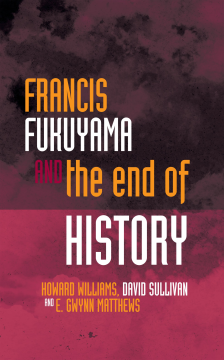
BOOK
Francis Fukuyama and the End of History
Howard Williams | E Gwynn Matthews | David Sullivan
(2016)
Additional Information
Book Details
Abstract
Fukuyama’s concept of the End of History has been one of the most widely debated theories of international politics since the end of the Cold War. This book discusses Fukuyama’s claim that liberal democracy alone is able to satisfy the human aspiration for freedom and dignity, and explores the way in which his thinking is part of a philosophical tradition which includes Kant, Hegel and Marx. Two new chapters in this second edition discuss the ways in which Fukuyama’s thinking has developed – they include his celebrated and controversial criticism of neoconservatism and his complex intellectual relationship to Samuel Huntington, whose Clash of Civilization thesis he rejects but whose notion of political decay is central to his more recent work. The authors here argue that Fukuyama’s continuing fundamental contributions to debates concerning the spread of democracy and threat of global terror mark him out as one of the most important thinkers of the twenty-first century.
Table of Contents
| Section Title | Page | Action | Price |
|---|---|---|---|
| Front Cover | Front Cover | ||
| Half-title Page | i | ||
| Title Page | iii | ||
| Copyright Page | iv | ||
| Contents | v | ||
| Foreword by Series Editor to the Second Edition | vii | ||
| Preface to the Second Edition | ix | ||
| Introduction | 1 | ||
| 1 Kant: History and the Moral Imperative | 7 | ||
| 2 Hegel: Spirit and State | 26 | ||
| 3 Marx: Communism and the End of Prehistory | 53 | ||
| 4 Fukuyama I: Reinventing Optimism | 70 | ||
| 5 Fukuyama II: Recognition and Liberal Democracy | 87 | ||
| 6 Fukuyama III: International Dimensions | 112 | ||
| 7 Popper: A Liberal Critic of the End of History | 128 | ||
| 8 Religion and the End of History | 150 | ||
| 9 Rewriting Modernity: History, Progress and Identity | 165 | ||
| 10 Fukuyama After the End of History | 184 | ||
| 11 Philosophies of History | 215 | ||
| Notes | 235 | ||
| Bibliography | 253 | ||
| Index | 261 | ||
| Back Cover | Back Cover |
